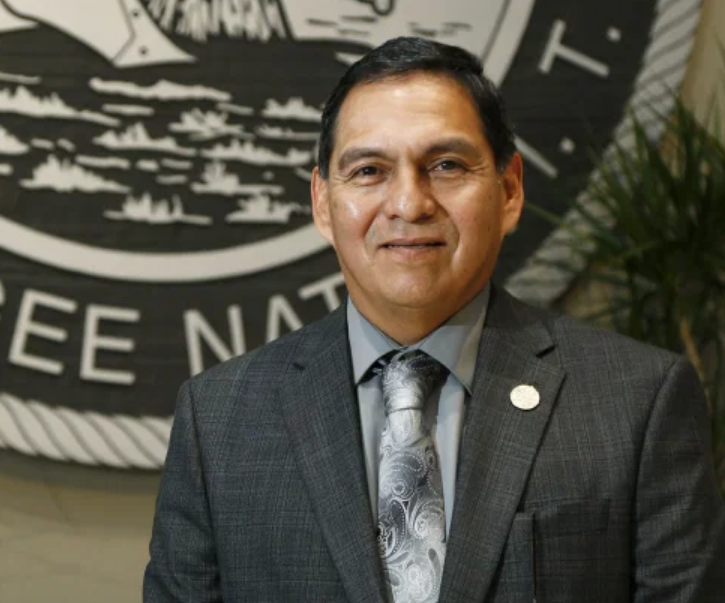
The day before Muscogee (Creek) Nation Principal Chief David Hill tested positive for COVID-19, he had been in a select meeting with Oklahoma Corporation Commission staffers and Commission chairman Todd Hiett to discuss the tribe’s possible control over oil and gas issues.
The resulting medical issue for Hill and others revealed that the tribe is apparently intent on taking advantage of a recent U.S. Supreme court victory called the McGirt case. It might also signal that the tribe could be in negotiations with state regulators about the impact of the ruling that sent initially raised more than casual interest by oil and gas leaders.
The tribe confirmed last Thursday that Hill had tested positive. Two days earlier, on Tuesday, Dec. 15, he and several other tribal leaders had been in a nearly one-hour long meeting at the Jim Thorpe building, headquarters of the Corporation Commission.
“Hill began experiencing mild symptoms on Wednesday night and was tested at the MCN Medical Center in Okmulgee, Okla. He is recovering at home and continuing his duties remotely, but he is not expected to return to the office until he is Covid-free,” reported the tribe.
The meeting was held in the main courtroom of the Thorpe building and now it appears that because of Hill’s COVID-19 testing, some commission staffers might be in quarantine.
A spokesman for the commission explained the Commission’s General Counsel advised him that such health information could not be released because of the ADA law. But the spokesman confirmed there had been a meeting between tribal leaders, commission staffers and chairman Hiett.
It has not been confirmed whether any senior staff members who attended the meeting have turned ill with COVID-19. But it was reported that Chairman Hiett was not well in recent days and meetings of the Corporation Commission have not been scheduled this week.
It is not known whether any tribal leaders who accompanied Hill to the meeting have been placed in quarantine or whether they too have become ill. The tribe did not respond to an inquiry by OK Energy Today.
“Again, the topic of discussion (as I understand it) was oil and gas regulation,” stated Matt Skinner, spokesman for the state agency.
It was the Muscogee (Creek) Nation that won the recent McGirt ruling from the U.S. Supreme Court in which the court said the tribe has authority over criminal prosecutions, not the state. As a result of the ruling, some tribes in the state have raised suggestions that they should also have regulatory power over the enforcement of energy rules, including those over oil and gas.
The tribal website stated that under Hill’s leadership, the Muscogee (Creek) Nation took the McGirt v. Oklahoma case all the way to the U.S. Supreme Court and won in a 5-4 ruling in July. The landmark decision reaffirmed that the reservation promised to the tribal nation by treaty continues to exist.
“Please continue to adhere to strict prevention guidelines and pray for the healing of all those in our nation who have been affected,” Hill said in a statement, according to the tribe.
COVID-19 issues aside, the meeting might be one of the first efforts of the Muscogee (Creek) Nation to explore whether it will have regulatory authority over oil and gas operations. The Seminole Nation recently attempted to enforce taxes on the operations but State Attorney General Mike Hunter responded by urging the tribe to drop the issue.
The Oklahoma Supreme Court recently in a Corporation Commission ruling that was appealed agreed to consider arguments over whether Indian tribes or the commission has jurisdiction over enforcement of energy and energy-related issues.
The case, Canaan Resources X vs. Calyx Energy III LLC was filed Dec. 8 and is listed as Case number CD-2020-01032T.
In challenging the commission over several Calyx operations in Hughes County, Canaan argued that because of the McGirt ruling, that “all civil jurisdiction, including oil and gas regulation within the original boundaries of the Creek reservation to the Creek Tribe and, by extension, for application to all the reservations of the Five Tribes.”
In other words, Canaan contends the commission as a result of the McGirt ruling no longer has regulatory authority over oil and gas operations on Indian land.
The Supreme Court agreed to take up arguments but court documents have yet to reflect any date for a hearing.





